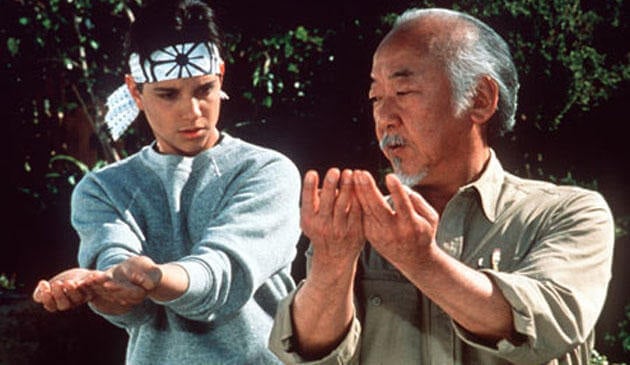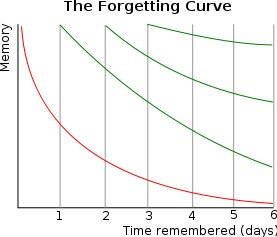
This post will show you how to learn vocabulary in a foreign language, based on my experience of learning 10,000s words in the eight languages I speak.
You'll learn a straightforward, reliable system which I consider the best way to memorize words without forgetting them later.
When you can increase your vocabulary on-demand, it gets a lot easier to speak your new language, and much more enjoyable too!
Also, you'll also see what Sherlock Holmes, Mr. Miyagi (from The Karate Kid), and a jazz musician can teach you about improving your memory … whatever your age or natural ability.
Curious?
I hope so, because this is fun!
(It's also the same system I teach in my StoryLearning courses, which you can try free here.)
Let’s get into it…
A Word On Memory (For The Sceptics)
(You can skip this section if you want to get right to it!)
Memory and memorisation stir up strong opinions among language learners, and the problems often begin with semantics.
For example, when I have brought up the topic of memorisation in the past, a frequent response is something along the lines of: “I don’t believe in memorisation. The best way to learn vocabulary is naturally – in context.”
This kind of miscommunication is typical of such discussions, so we need to start by defining what we’re talking about here.
Increasing your vocabulary means two things…
- Learning new words
- Not forgetting them
Now, there are a myriad of ways to both learn a new word, and then to not forget it.
One way to do this is to choose new words and memorise them in isolation through rote learning, flashcards, etc. (Let’s call these memory techniques.)
On the opposite extreme, you might take a more holistic approach and try to learn new vocabulary naturally by reading books or listening to podcasts etc.
(This is the foundation of my StoryLearning method.)
Neither approach is better. They’re different.
However, people who favour a more holistic approach will often criticise so-called “memory techniques”, labelling them unnatural.
This is a misunderstanding.
What I argue in this article is that, however you study – with textbooks, flashcards, novels, or word lists – the process of memorisation is broadly the same. (Although it might not feel like it.)
In other words, from the time you encounter a new word, whether in a book or in a list – you need to take it on the same journey through your mind to reach the point where you own it, and can use it naturally in conversation.
The A.R.T. technique you’ll learn in this article is my attempt to crystallise this process and identify the core process you need to use to learn and memorise vocabulary effectively, in a way that can be happily integrated into any language learning methodology.
Side note: I think the terms memory and memorisation are not the most appropriate, because they appear not to take account of the rest of the language learning process. However, whatever the best term, “I have a bad memory” is the way a novice language learner tends to relate to the problem of growing their vocabulary. For that reason, I use it here.
What’s Wrong With My Memory?
I’m willing to bet you recognise the following feelings when learning foreign language vocabulary:
- You spend ages learning new words, but they never stick
- You recognise a word when you see it, but draw a blank when you need it in conversation
- You have no system for learning words, leaving you feeling like you’re wasting your time and clutching at straws
…and you’d be forgiven for thinking you’re just not very good at remembering things.
But it’s not the fault of your memory!
Your brain is an impressive piece of kit and retains enormous amounts of information on a daily basis.
And you certainly already know plenty of words in your target language – words you’ve picked up randomly over time through exposure.
The problem is how to learn vocabulary “on demand”, right?
The words you want, when you want them.
So, it’s not a problem with your memory – your memory is capable of amazing things.
What you lack is a reliable system for harnessing the power of your memory, and practising in a way that helps you reliably remember new words and phrases – the ones you want – so you never forget them.
You also need to be able to practise them in such a way you can recall them on demand and use them in conversation, so you become more fluent at the same time.
And that’s easy to do… with a bit of training.
Introducing…
How to learn vocabulary in a foreign language with the A.R.T. technique
You can learn new words and phrases from lots of different sources: books, conversations, movies, and so on.
There are also many different approaches and attitudes towards memorising vocabulary, which range from the very passive to the very active.
The method you use to learn vocabulary depends largely on your circumstances, your environment, and the language you're learning.
For example, if you live abroad and are surrounded by the language every day, you may find yourself learning a lot of new vocabulary naturally. (Equally, you may not!)
When it comes down to it, there are three parts to learning vocabulary in another language:
- Attention
- Repetition
- Try it out!
Let's get into it…
The A.R.T. Of Memory

[Image credit: dynamosquito]
When Sherlock Holmes begins a new case, he starts by looking for clues.
He examines a crime scene, and he’ll be faced with hundreds of pieces of information… but only a handful will prove to be important…
And together, those few pieces of vital information paint a picture of what happened.
Sherlock’s task is to decide what’s important, and what to ignore. That’s how he solves the most complex cases.
Applying this concept to how to learn vocabulary, the big question you have to ask, before we even get to the memory stuff, is:
“What are you going to memorise in the first place?”
After all, the English language has 1,025,109 words (2014 estimate)… you certainly don’t need all of them!
One of the keys to making quick progress in a language is: Learn vocabulary that is relevant to you.
When you learn foreign language vocabulary, some words are going to be more useful to you than others. Choosing the most important words to learn in a new language will help you talk about your job, your interests, or other important things quickly.
This means that you have to be selective about learning new words.
With only a finite amount of time to study every day, you can choose to learn words that are useful… or not.
Don’t overthink this.
As you encounter new words in your target language, ask yourself: “Which words and phrases are going to be most useful for me?”
(This is one of the 10 Rules of StoryLearning, which must be obeyed at all times!)
Example
Let’s say you’re learning French because you want to retire to a village in the South of France.
You’re still a relative beginner.
- You’re working your way through a popular French textbook, and in one particular chapter of the book, you learn 10 words you might need to go through airport security in French.
- Later that week, you attend a language event, and you meet a friendly French man, who lets you practise your French with him. As you get to know each other, you encounter 10 words you didn’t know. (You write them down afterwards, in case you forget!)
The next day, you have a choice…
- Do you learn your textbook vocabulary about airport security?
- Or do you learn the words from the conversation?
The answer should be obvious.
- You will likely never need to speak French in airport security
- Therefore, that vocabulary will be very “low value”
- Meanwhile, the words from the conversation will almost certainly come up again – probably in your next chat!
- Therefore, learning them will immediately help you speak French better- it's one of the best ways to learn vocabulary.
Despite this, most people simply work through their textbook, one chapter after another, blindly trying to learn everything they encounter. This is not smart learning.
So, having chosen relevant vocabulary to learn, your next task – like Sherlock – is to become intimately familiar with your new words…
Image Credit: 118316968@N08
1. Attention
 What is “A”?
What is “A”?
- “A” = Attention
Let’s say you’re reading a passage in your textbook, and you’ve carefully selected a few words you want to learn.
Next, you need to bring your full Attention to each individual word.
Look at the word in-depth, read it aloud, and try to create associations in your mind.
Think:
- Does the word sound similar to another word you know, in any language?
- How about part of the word? Does part of the word sound like anything else you know?
- What does the word itself mean to you in your life? (E.g. where did you first hear it? Who were you with?)
- Does the gender of the word have any effect on its meaning for you? (E.g. In French, the moon is feminine: la lune. Does this help you remember it in any way?)
Look for anything you can, however small, that can become a “hook” for your memory and help you recall it later.
Imagine you’re Sherlock, with your magnifying glass, looking at the word from every conceivable angle.
Expand beyond the word
Look at the whole sentence and see what other words are there. Like Sherlock – piece together the crime scene and look for the hidden story.
Use all the available context to help make sense of the new word:
- Does the word itself combine with another word you already know? (e.g. to take a risk)
- Does the sentence itself have any meaning for you – something that might serve as an anchor in your memory? (e.g. Did you take a big risk once, that you can think of with this word?)
Now, this is not an exact science!
Your memory can be unpredictable, but by bringing your full Attention to a word, and attacking it from many different angles, you’ll soon find something your brain will latch on to and remember later.
Writing down new words and just hoping simply isn't enough.
(Yes, I know there are times when you might learn things naturally, but remember, I'm trying to create reliable study systems!)
So, having done the “preparation work” of selecting important vocabulary to learn, here's what I do…
I sit down, focus, and create mnemonics to help me remember every new word I've selected.
Imagine the situation – what actions/events spring to mind? Can you link the action with the word in some way? Can you link the word with an image in your mind?
After struggling to remember the Cantonese word chut3 fat3 (to go out) for ages, I eventually got it by imagining a really fat guy trying to leave through my front door out into the street. Ridiculous, right? But it works!
Attention is the first part of the process, but it won’t always be enough by itself.
You’ll still have some more work to do in order to get the new vocabulary into your long-term memory.
2. Repetition
This brings us to the second part of the A.R.T. technique:
- “R” = Repetition
Wax On, Wax Off

In the 1984 classic The Karate Kid, Mr. Miyagi instils in Daniel an appreciation for repeating seemingly mundane tasks.
Wax on, right hand. Wax off, left hand. Wax on, wax off. Breathe in through nose, out the mouth. Wax on, wax off. Don’t forget to breathe, very important.
Among other things, Mr. Miyagi wants to show Daniel the importance of patience and trust.
No-one becomes great overnight.
When it comes to foreign languages, however, people are prone to having unrealistic expectations of themselves. (This is the Comparison Villain at work!)
Maybe you’ve been guilty of this, too?
I often get told:
Olly, I just don’t know how you do it. I can’t seem to remember any new words!
There’s an assumption that some people are naturally good at remembering things, without having to work much at it.
But it’s quite the opposite.
Every prolific language learner I know works exceptionally hard at their new languages, every day.
And that goes for learning vocabulary, too.
Take me, for example… I forget every new word I learn. (Almost without exception.)
Maybe 5, 10, 20 times or more!
But rather than get annoyed or frustrated at how “terrible” my memory is… I work at it.
Every day.
Wax on, wax off.
Why is Repetition Important To Memory?
Here's why repetition is an essential part of the memory process when you learn new vocabulary:
- Your brain naturally forgets things
- Forgetting things is normal – it’s not a problem!
- Because you know you will forget new words, you then need to put a plan
in place to encounter that word plenty of times
(No-one becomes great overnight, remember?)
You'll notice I used the word plan.
That's right – even if you acknowledge the importance of repetition, that doesn't mean you'll actually do it!
You're a busy person, with lots of competing commitments. Systematically repeating new vocabulary probably doesn't happen by accident in your daily life 🙂
So, a sensible system for remembering new vocabulary needs to plan for repetition from the outset.
What Does A System For Repetition Look Like?
Let’s say, for the sake of argument, that you need to encounter a new word 10 times for it to stick.
That means you need to plan to review each new word 10 times over a few days or weeks.
This principle is commonly represented using the Forgetting Curve:

For this to be effective, you need an organised system for reviewing your vocabulary that you can repeat at will.
How to learn vocabulary effectively
1) You could take a “natural” approach to language learning, where you simply listen to and read things you enjoy.
This is fun, but you quickly become overwhelmed with new words, and the same words don’t come up often enough for you to be able to memorise them.
An effective system needs to help you repeat vocabulary in a more isolated way to have any hope of remembering it.
2) You could take a specific passage of text and read it over and over.
This is more controlled because you see your new words over and over. But the problem with this is that you start to “learn the text”, and know what’s coming, which is not much help for your memory.
3) You could use activities specifically designed to isolate and practice new words:
- Make a word list and read it over and over
- Practise using new words with your teacher in conversation
- Write a speech and memorise it
- Make sentences using your new words
These are better and more targeted.
But the problem you will face is this:
The responsibility for how and when to review each word is yours alone!
Keeping track of reviewing all your new words can quickly become overwhelming when you’re juggling 101 other things in your life.
Creating Your Repetition System
The difficulty of managing your system for the Repetition of new words is what makes flashcard-type apps so popular…
- They show you your chosen words at strategic intervals to help you remember them
- There’s no need for you to track when each new word is “due for review”…the software looks after that for you
- All you need to do is show up each day and give your full Attention to every new word you’re learning
Many people have a love/hate relationship with flashcards (and you should be wary of the App Villain), but given what you’ve learnt so far, using A.R.T., a couple of things should be clear…
- Attention – this is the deep thinking you bring to each word, before you even start the review process
- Repetition – this is the system of reviewing words and their associations, it’s not the memory strategy
Flashcards are popular, but they're not the only way to review your words.
There are many other powerful systems that ditch technology altogether, and rely on the power of the mind:
- The Goldlist Method uses a system of 2-week intervals
- Memory Palaces use a location-based recall system
But, whatever system you use to learn vocabulary…
Repetition of vocabulary should NOT be an excuse to blindly “hammer in” new words until you remember them!
Your system should be used to simply:
- Store your new words
- Keep them organised
- Periodically test you on them, so you can reinforce the associations you’ve made in your mind and commit them to your long-term memory
Your memory and mind still does the heavy lifting.
The system for Repetition just facilitates it.
Best of all, because this all happens over a period of days or weeks, your brain has the chance to thoroughly memorise the words on a subconscious level, and commit them to your long-term memory.
When you come to have conversations in your target language, you’ll find you can recall the words with great ease, because you’ve been conditioning your brain over a period of time.
So, next time you catch yourself getting frustrated at forgetting a word…
Remember… Forgetting is normal!
Mastering anything takes time, and more than one attempt!
Mr. Miyagi knew this.
So, stack the deck in your favour, and plan a reliable system for repetition of the new foreign language words you’re trying to learn.
Let's move on to the final part of the A.R.T system for how to learn vocabulary fast.
3. Try
When you speak a foreign language with someone, you are performing.
It’s like theatre.
It may not be nice to think of it that way, but that’s exactly what it is.
It’s the moment when all your preparation is put to use…
And, if we are honest, you are often judged by your performance.
This brings us to the “T” in A.R.T.…
- “T” = Try
Yes, it’s a bit trite, but it makes the point clearly…
KEY POINT: Learning words isn't enough. You need to take the vocabulary you are memorising, and start to use it in conversation with real people!
So you learn new words, so what? You've got to get the words out of your head, and into the real world.
When your new vocabulary comes up in a real conversation, you achieve two things:
- You practise recall, so it becomes easier to remember the word on demand
- You practise recognition, so you learn to recognise the words when used by other people
Often, actually practising the things you've learnt in your textbook is considered an afterthought.
“Oh, I should probably practise those new words a bit!”
But, no!
Real conversation is unpredictable, with lots of ups and downs to navigate with the other person…
A real conversation is not an easy place to practise using vocabulary you haven’t mastered yet…
And that’s precisely why you have to do it!
Use It Or Lose It!

Image Credit: http://bit.ly/2iFqbdx
Just like the 52nd Street musicians, trying out their new scales in performance every night…
The essence of language is, first and foremost, to actually use your vocabulary.
And that’s why Try is the last part of A.R.T. – you’ve got to try it out!
But it might not feel so easy.
In fact, when you come to speak with someone, you might feel the words you've studied aren't always available on the tip of your tongue.
(In other words, you can’t remember new vocabulary during the flow of conversation.)
Understanding how to do this effectively is the last part of the puzzle.
If you know how to not only select and how to learn foreign language vocabulary, but actually practise it in conversation, the sky’s the limit!
It’s only when you truly start to use new vocabulary that you begin to master it.
You’ll be able to reliably learn anything you want, and use it confidently in conversation, recalling words on demand.
This last part can take time, but it all starts by Trying!
How To Try Out Your New Vocabulary
As we saw earlier, conversations can be a tough place to practise new vocabulary, especially if you’re talking with strangers and feel under pressure.
This means you need to Try using your new vocabulary in a way that doesn’t rely on random opportunities in random conversations.
- Firstly, you need to have a conversation partner or tutor, who you can turn to regularly to practise speaking
- As part of these sessions, your tutor needs to help you deliberately practise your new vocabulary
Here’s how:
- If you’ve followed the A.R.T. procedure, you should have selected the vocabulary you want to memorise, perhaps even creating a list
- Simply send that list of vocabulary to your tutor. Alternatively, show them the chapter from the textbook you’re studying. Something that puts you both on the same page
- Tell them you want to practise it!
Then, in the lessons themselves, your job is to use that vocabulary as much as possible in conversation – however basic or unnatural it may be!
The point isn’t to have an elegant conversation, it's to train yourself to recall the words on demand, and to hear another person using them.
With a bit of practice and creativity, there are tonnes of ways you can both play with the words to help you practise them.
It’s a lot of fun!
The only thing you need to do is make sure your tutor knows what you want to do, and is happy to help you!
Did You Get The Basics Right?
 So, you know it’s important to Try out your new vocabulary!
So, you know it’s important to Try out your new vocabulary!
Remember, most of the hard work is done before you come to speak.
Yes.
You shouldn’t rely on the speaking to do all the hard “memory work” for you!
If you’ve done your job with Attention…
If you’re using the right techniques for Repetition…
You will find that Trying out your new vocabulary should be the really fun part, and the majority of the vocabulary you’ve been studying will already be on the tip of your tongue!
Every language learner you meet will tell you something different about the way memory works, and the best way to learn vocabulary in a foreign language.
I suppose it's only natural, given that our brains are all unique!
However, whatever method you may come across…
Every approach to learning vocabulary ultimately uses the same foundations.
One way or another, each new word you learn needs to be taken through the 3 stages of the A.R.T. technique, in order to become a permanent part of your active vocabulary:
A word you'll never forget
Once you understand what works for you and the best way to learn new words, the whole memory process becomes predictable… and that’s the secret to effective, stress-free language learning!
- What are your thoughts on how to learn vocabulary in a foreign language? Let me know in a comment below!
- Share this post on social media using the buttons on this page!
- If you want a better memory, why not sign up for my free course…

Olly Richards
Creator of the StoryLearning® Method
Olly Richards is a renowned polyglot and language learning expert with over 15 years of experience teaching millions through his innovative StoryLearning® method. He is the creator of StoryLearning, one of the world's largest language learning blogs with 500,000+ monthly readers.
Olly has authored 30+ language learning books and courses, including the bestselling "Short Stories" series published by Teach Yourself.
When not developing new teaching methods, Richards practices what he preaches—he speaks 8 languages fluently and continues learning new ones through his own methodology.










































